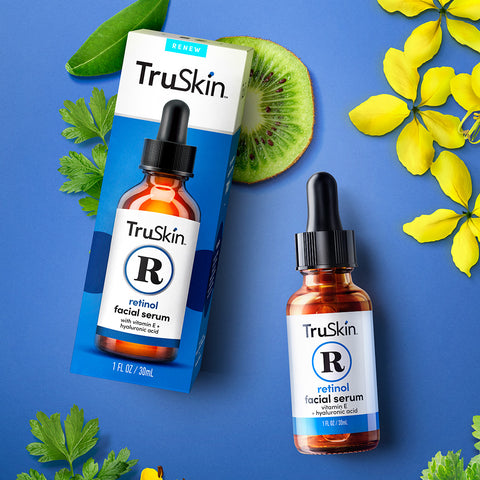
Let’s Talk Retinol: Your Questions Answered
Photo by Andrea Piacquadio from Pexels
Retinol opens up a whole world of confusion for some people. But when it comes to proven anti-aging skincare ingredients it gives us all the feels.
That’s why knowing what it is and, more importantly how to make it work for you, well, that knowledge is priceless. Not sure of the difference between retinol and retinoic acid? Wondering whether a topical retinoid is OK for your super-sensitive skin? Then get comfy, because we have all the answers to your most pressing questions, right here.
Q: First things first, what are retinoids?
A: Retinoids are active, topical forms of vitamin A that can be split into two camps: retinol and tretinoin.
Vitamin A is a fat-soluble vitamin found naturally in eggs, yellow and orange fruit and veggies, liver, fish, cheese and butter. It’s an essential part of a well-balanced diet and helps maintain healthy cell growth while boosting your vision and reproductive and immune systems.
The active form (the one that does all the good stuff) of vitamin A is called retinoic acid and its topical counterpart is called tretinoin. Tretinoin is a clever little prescription-only ingredient that delivers retinoic acid to the skin to stimulate healthy cell turnover for a glowing, more youthful complexion.
Retinol, meanwhile, is an over-the-counter, gentler version of tretinoin that biochemically does the same thing, but must be converted into retinoic acid by the skin before it can get to work. Studies have shown that retinol is 20 times less potent that tretinoin, but it’s considerably kinder on the complexion which why it’s every beauty editor’s/derm’s/celebrity’s favorite anti-aging ingredient.
Still confused? Then just remember this, retinol is the tortoise to tretinoin’s hare.
Q: What are the benefits of using a topical retinoid?
A: When absorbed by the skin, retinoic acid molecules attach themselves to the center of cells where genetic information is stored. Here, they trigger and activate certain genes to increase collagen production and stimulate the skin to turnover more efficiently. This not only helps soften, thicken and plump up the skin but offers no end of benefits for enlarged pores, acne, pigmentation and aging skin.
Research also shows that retinoids have powerful antioxidant properties, which is why many people call them the ultimate miracle-workers. We, on the other hand prefer not to subscribe to such bold promises. Let’s just say they’re up there with the most proven and effective skincare ingredients, shall we?
Q: So, does that mean tretinoin is better than retinol?
A: Yes and no. Tretinoin is only available on prescription and is often advised to patients who are serious about treating fine lines, wrinkles and discolorations. Derms and doctors see tretinoin as the gold standard of retinoids because it’s so pure, but it packs such a retinoic acid punch that it can be hard to tolerate – especially if you have sensitive skin.
This is why we truly believe that over-the-counter products are the cat’s whiskers. Retinol can be just as effective as tretinoin, as long as you shop wisely and are happy to play the long game. Derivatives of retinol such as retinyl palmitate, retinyl propionate, retinyl acetate and retinyl linoleate are super weak and, in our opinion, not worth it. But choose formulas that contain pure retinol and while visible results may take a little longer, you’ll see just as many benefits as you would from a tretinoin product.
Q: If I start using a retinoid regularly, how long will it be before I see improvements in my skin?
A: Tretinoin usually offers visible results at around the three month mark. Retinol, due to its gentler nature, however, may take up to six. The good thing is that retinoids are among the most highly researched ingredients in skincare and show proven, visible results. Unlike other headline-grabbing ingredients that promise the world but fail to deliver, retinoids have been tried and tested for decades. And they work. They just do. But patience is a virtue.
Q: What’s the best way to use topical retinoid?
A: Great question. Retinoids are best used at night because sunlight can deactivate vitamin A. Nighttime use is also advised to reduce any dryness and redness you may experience from the sun. Contrary to popular belief, retinoids themselves are not sun sensitizing, but they do thin the very top layer of your skin to help rid your complexion of pore-clogging dead skin cells. This is a good thing, but it also disrupts the natural protective barrier which is why you should apply it at night, then in the morning wear a daily, broad-spectrum sunscreen with SPF 30 or above.
Another tip is to start slowly. Most derms agree you should begin with a low concentration of retinol such as 0.5-1.0 percent. Apply it to clean skin every other night to begin with, then as your skin acclimates you can up your application to every night. After a few months, you could also move up to a higher concentration as tolerated. And if your skin feels dry? Then feel free to layer your favorite moisturizer on top.
Q: Is it true you should never apply retinol to damp skin?
A: In a word, no. There’s no real evidence to suggest that applying retinol to damp or wet skin will intensify skin irritation. Nor will it render the ingredient more or less effective. More importantly, you should ensure your skin is clean and well prepped before applying your retinol product. Cleanse thoroughly and gently exfoliate any dry, flaky patches to make way for the fresh skin underneath. This helps the active ingredient penetrate your skin which actually reduces irritation.
Q: Speaking of which, my skin became really dry and irritated after introducing retinol into my skincare routine, should I stop?
A: Dryness, flaking and slight redness are part of what’s called the purging process, so don’t worry, this is very normal. Skin purging is just your skin reacting to the active retinol which accelerates the exfoliation process and promotes skin cells to turnover quicker than normal. This is great for the health, look and feel of your skin in the long run, but can temporarily exacerbate redness, irritation and scaling.
The good news, however, is these side-effects are temporary so try to push through them. There are also a few tricks to help you avoid them in the first place. First, slowly introduce retinol into your routine to allow your skin to adjust – and yes, once a week is OK. Then you can up the frequency by one day per week as your skin becomes more tolerant. If the irritation continues or gets worse, take your usage back down again and/or try a super-low concentration – we’re talking 0.5 or even 0.3 percent.
Still struggling? Then speak to a skincare expert because retinol might not be for you. There are plenty of other effective skincare ingredients that are more tolerable for sensitive skin like niacinamide, aloe vera or hyaluronic acid.
Q: Can I use retinol with other active skincare ingredients like vitamin C?
A: Combining active skincare ingredients can sometimes have disastrous effects if left in the wrong hands. But that is the key because if you know what you’re doing or better still, leave it to the experts, the results from ingredient cocktailing can be glorious.
Take retinol and vitamin C, for example. Studies have shown that, together, this little power couple offers visible benefits to aging skin such as an improvement in texture and tone, plus a notable reduction in photodamage – aka hyperpigmentation. Retinol and vitamin C are both proven antioxidants and work well to defend the skin against the damaging effects of the sun. We actually combine them with hyaluronic acid and niacinamide in our Vitamin C-Plus Super Serum for a potent, but surprisingly gentle fix of skin-loving actives.
As a side-note, retinol also combines well with AHAs and BHAs like glycolic and salicylic acids. In fact, like John Krasinski and Emily Blunt, they bring out the best in each other to increase turnover and leave you with healthy, glowing skin.
Q: At what age should I start regularly using a retinol product?
A: This depends on each individual because everyone’s skin ages at different rates based on their genes, lifestyle, diet and overall health. Someone living the high-life in the full California sun may find their skin ages at a much faster rate than someone of the same age living in less sunnier climes, for example. That being said, most experts agree that somewhere in your mid to late 20s is ideal, but you know your skin and it’s never too early (nor too late)…









